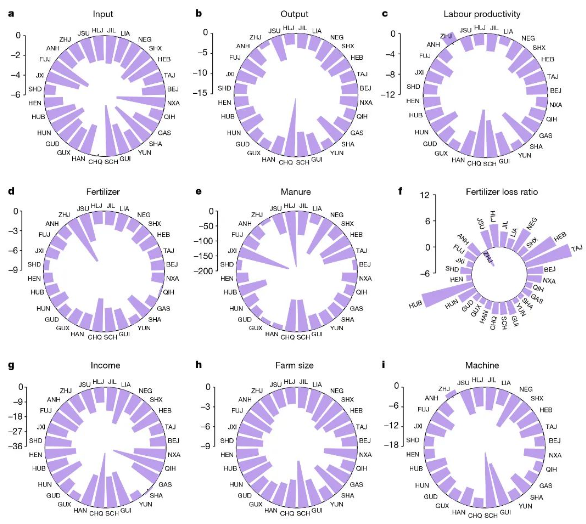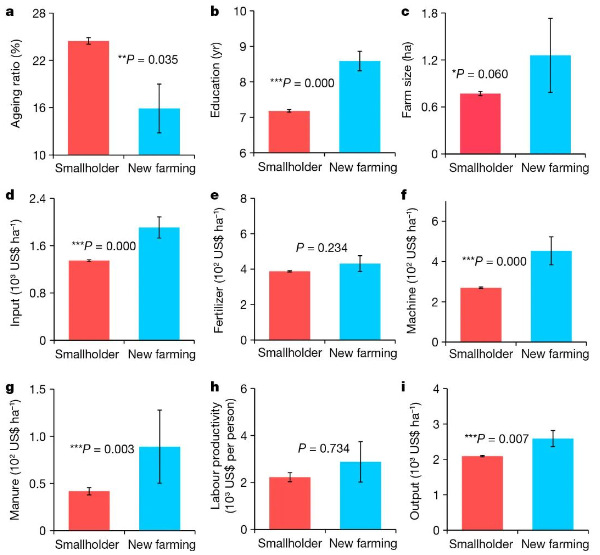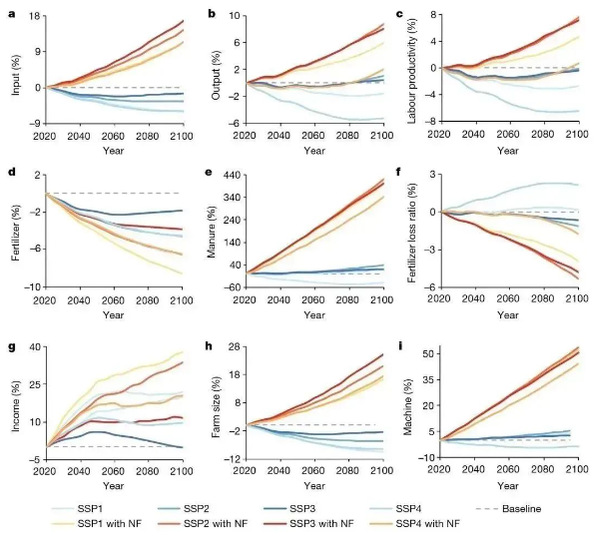Impact of ageing on agricultural sustainability in China: ZJU scientists offer solutions
According to the National Bureau of Statistics, approximately one in every five people in China is over 60 years old. This demographic shift towards an ageing population is posing great challenges on agriculture sector. A new study has quantified the impact of ageing through a set of data science research, providing the first explanation of the role of ageing in agriculture and solutions to address the issue. The results were published in Nature on February 22.
How does rural ageing threaten us?
According to data from the National Bureau of Statistics, the proportion of the rural population over 65 years old in China doubled from 2000 to 2019, reaching about 15% in 2019. It is expected that the ageing of the rural population will continue to accelerate in the coming decades. Older farmers in rural areas typically have lower levels of education, which could be challenged to adopt measures of scientific management and advanced technologies. Consequently, this can have a negative impact on agricultural productivity and efficiency.
To understand how rural ageing affects agricultural production and sustainability, the research team, led by Prof. GU Baojing of the Zhejiang University College of Environmental and Resource Sciences, used data from a survey of about 15,000 households with crops but no livestock across China, and explored the relationship between rural population ageing (the proportion of individuals over 65 years old at the household level) and agricultural sustainability based on a multiple regression model (MRM).
The results showed that in 2019, about 4 million hectares of cropland in China were abandoned related to rural ageing, which reduced the average farm size by about 4% and posed a great threat to cropland protection and food security. These changes led to a reduction of agricultural inputs, including chemical fertilizers, manure and machinery, which decreased agricultural output and labour productivity by 5% and 4%, respectively, further lowering farmers’ income by 15%. Meanwhile, fertilizer loss increased by 3%, resulting in higher pollutant emissions to the environment.

Impact of ageing on agricultural sustainability across China’s provinces in 2019.
China's rural ageing population threatens agricultural sustainability from economic, social, and environmental dimensions. Prof. GU said, If no intervention measures are taken, future population ageing will bring severe food security challenges and environmental pollution pressures, posing a serious threat to ecosystems and human health.
New agricultural management models offer a solution
When comparing traditional smallholder farming with new farming models such as family farms, cooperative farms, and industrial farms, the researchers found that these new farming models were less affected by population ageing. With more young people and higher levels of education and larger farm size, the new farming models had higher total farming inputs, including fertilizer and machinery, which substantially improve agricultural outputs and labour productivity.
In 2019, total input, manure and machinery input in new farming models were 41%, 113% and 68% higher than for traditional smallholder farming, respectively. Consequently, output per area increased by 24% and labour productivity was improved by 29% in new farming models.

Comparison of smallholder and new farming models on agricultural indicators in 2019.
The team also simulated the potential impact of promoting new farming models on agriculture in China. They found that by encouraging the transition to new farming models, the negative consequences of ageing can be reversed. Agricultural input, farm size, and farmers’ income could increase by approximately 14%, 20%, and 26%, respectively, and fertilizer loss would reduce by 4% in 2100 as compared with that in 2020.

Relative changes of agricultural sustainability related to ageing under SSP scenarios by 2100.
Reviewers of the paper believe this research greatly promotes the scientific understanding of the relationship between demographic transitions and agriculture, sheds new light on the impact of population ageing on agriculture, and provides a critical path for addressing rural ageing to achieve sustainable agriculture. It also has important implications for achieving the United Nations' Sustainable Development Goals of ending poverty and hunger, particularly in China and other countries facing similar challenges.
More information: Prof. GU Baojing from the College of Environmental and Resource Sciences is the corresponding author. Prof. ZHOU Xinyue from the School of Management and REN Chenchen, a doctoral student from the School of Public Affairs and the College of Environmental and Resource Sciences are first authors.
Image credit: The research team led by Prof. GU Baojing; Pixabay